Back To Godhead Vol 49, 1970-1973
|
As foretold in Vedic scriptures, the Supreme Personality of Godhead appeared on earth 500 years ago in the form of Lord Caitanya, who is God Himself playing the role of a devotee of Godhead. The eight verses entitled Sri Sri Siksastakam, which were the only written instructions of Lord Caitanya, reveal the essence of the Krsna consciousness movement.
Sri Sri Siksastakam
by
Sri Krsna Caitanya Mahaprabhu
translated by His Divine Grace A.C. Bhaktivedanta Swami Prabhupada
with purports by His Holiness Subaldasa Svami
ceto-darpana-marjanam bhava-mahadavagni-nirvapanam
sreyah kairava-candrikavitaranam vidyavadhujivanam
anandambudhi-vardhanam pratipadam purnamrtasvadanam
sarvatma-snapanam param vijayate sri-krsna-sankirtanam
TRANSLATION
Glory to the Sri Krsna sankirtana, which cleanses the heart of all the dust accumulated for years and extinguishes the fire of conditional life, of repeated birth and death. This sankirtana movement is the prime benediction for humanity at large because it spreads the rays of the benediction moon. It is the life of all transcendental knowledge. It increases the ocean of transcendental bliss, and it enables us to fully taste the nectar for which we are always anxious.
PURPORT
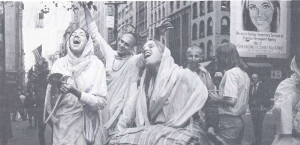 The conditioned soul is covered from time immemorial by the dirt of the accumulated reactions of his sinful activities. Due to the reactions of his past sins, he becomes further engaged in sinful activities and becomes more and more forgetful of his constitutional position as part and parcel of the Supreme Lord Sri Krsna. Due to forgetfulness of his spiritual nature, he identifies himself with the temporary material body and its paraphernalia. Thus, rather than serving Krsna in loving devotion, he is forced to serve maya, the limited mundane potency of the Lord. The living being is never independent in any stage of existence, either conditioned or liberated, but when he is under the control of maya he suffers, and when he is under the control of Krsna he enjoys life in the association of the Lord and His devotees.
The conditioned soul is covered from time immemorial by the dirt of the accumulated reactions of his sinful activities. Due to the reactions of his past sins, he becomes further engaged in sinful activities and becomes more and more forgetful of his constitutional position as part and parcel of the Supreme Lord Sri Krsna. Due to forgetfulness of his spiritual nature, he identifies himself with the temporary material body and its paraphernalia. Thus, rather than serving Krsna in loving devotion, he is forced to serve maya, the limited mundane potency of the Lord. The living being is never independent in any stage of existence, either conditioned or liberated, but when he is under the control of maya he suffers, and when he is under the control of Krsna he enjoys life in the association of the Lord and His devotees.
The Sri Krsna sankirtana, or the congregational chanting of the holy names of God, is able to immediately cleanse the heart of all the dirt that accumulates there for millions of years. This is the result of just the dim reflection of the holy name. During the night, there is fear of thieves, ghosts, murderers, etc. In the morning, before the sun even rises on the horizon, it dispels all such fears by its first rays of light. In the same way, before the holy name makes its full appearance, it dispels the darkness of material ignorance and clears away heaps of sinful activities which have not yet manifested themselves. Thus one is freed from karmic reaction and placed on the liberated platform of life. In this way, the door to devotional service is opened.
This sankirtana movement inaugurated by Lord Caitanya is the special dispensation for this age of Kali. In previous ages the path of spiritual realization was long and difficult. In Satya-yuga, when men lived for one hundred thousand years and conditions were favorable for meditation, people could attain success by practicing yoga for thousands of years together. In Treta-yuga, when the life span was reduced to ten thousand years and conditions were not as favorable, the recommended process of spiritual realization was by elaborate and costly sacrifices. In the Dvapara-yuga, when man’s life was reduced to one thousand years and conditions were still less favorable, the recommended process was temple worship. Now in this age of Kali-yuga, when life is reduced to a mere one hundred years and the living conditions are growing worse and worse, the one recommended and practical way of achieving success in spiritual life is by the congregational chanting of the holy name of God. This is the simplest and most effective means of reaching God. What was achieved in Satya-yuga by meditation, in Treta-yuga by sacrifices and in Dvapara-yuga by temple worship is now achieved in Kali-yuga simply by utterance of the holy name—Hare Krsna, Hare Krsna, Krsna Krsna, Hare Hare/ Hare Rama, Hare Rama, Rama Rama, Hare Hare. Therefore, great sages and saintly persons sometimes pray for the advent of Kali-yuga in order to take advantage of this simple and sublime process for going back home, back to Godhead.
Srila Rupa Gosvami prays to Lord Caitanya as follows:
namo maha-vadanyaya krsna-prema-pradaya te
krsnaya krsna-caitanya-namne gaura-tvise namah
“I offer my respectful obeisances unto the Supreme Lord Sri Krsna Caitanya, who is more magnanimous than any other avatara, even Krsna Himself, because He is bestowing freely what no one else has ever given—pure love of Krsna.”
All over the universe, Krsna is worshiped with awe and reverence, but such a form of worship does not satisfy Him. He is actually attracted by the spontaneous loving service rendered to Him by the residents of Vrndavana. Seeing that He had not bestowed such loving service upon the world for a long time, the Lord came in His devotional aspect of Sri Krsna Caitanya Mahaprabhu and bestowed pure love of Krsna upon the world by means of the sankirtana movement. He personally inaugurated this Sri Krsna sankirtana and overflooded the whole universe with love of God. This movement is carrying on still, and it gives us the highest realization of the transcendental life of full bliss and knowledge in eternity and allows us to enter into the loving exchanges of Sri Sri Radha and Krsna in Vrndavana.
namnamakari bahudha nija-sarva-saktis
tatrarpita niyamitah smarane na kalah
etadrsi tava krpa bhagavan mamapi
durdaivamidrsamihajani nanuragah
TRANSLATION
O my Lord, Your holy name alone can render all benediction to living beings, and thus You have hundreds and millions of names like Krsna and Govinda. In these transcendental names You have invested all Your transcendental energies, and there are no hard and fast rules for chanting these names. O my Lord, out of kindness You enable us to easily approach You by chanting Your holy names, but I am so unfortunate that I have no attraction for them.
PURPORT
There is no need to take to any process of spiritual realization other than the recitation of the holy name. In the Vedanta-sutras, Fourth Chapter, 4th adhikarana, 22nd sutra, it is stated, anavrttih sabdat: “By sound vibration one becomes liberated.” Simply by chanting the holy name constantly, one can go back to Godhead and never have to return to this miserable material world. It is also stated in Bhagavad-gita, Eleventh Chapter, 36th verse: “The world becomes joyful hearing Your name, and thus do all become attached to You.” Thus Arjuna also accepts the potency of the holy name.
In the Narada-pancaratra it is stated that all the Vedic rituals, mantras and understanding are compressed into the eight words Hare Krsna, Hare Krsna, Krsna Krsna, Hare Hare. Similarly, in the Kali-santarana Upanisad it is stated that these sixteen words, Hare Krsna, Hare Krsna, Krsna Krsna, Hare Hare/ Hare Rama, Hare Rama, Rama Rama, Hare Hare, are especially meant for counteracting the degrading and contaminating influence of the materialistic age of Kali.
In the Brhan-naradiya Purana, it is clearly stated that it is only chanting of the holy name of Hari (Krsna) that can save people from the problems of materialistic existence, and there is no other alternative, no other alternative, no other alternative in this age of Kali. This automatically eliminates the usefulness of the processes karma, jnana and yoga. Therefore this chanting process is the one simple and sublime process of achieving the desired goal of life. One need not take to any other process.
The Lord has thousands and millions of names for this purpose. Any name of God will do, but the ecstatic method, the easiest means for most people, is to chant the Hare Krsna mantra: Hare Krsna, Hare Krsna, Krsna Krsna, Hare Hare/ Hare Rama, Hare Rama, Rama Rama, Hare Hare. If one feels that this is a sectarian name and prefers to chant any other authorized name of God, that is approved, but Lord Caitanya and His followers have chanted the Hare Krsna mantra, and therefore it is authorized for all people of all times and places.
The holy name of Krsna is nondifferent from Krsna Himself. In the material world we find a difference between the name and the object. If we are thirsty and simply chant “water, water, water, water,” it will not satisfy us. But, if we want Krsna and chant “Krsna, Krsna, Krsna, Krsna,” He is personally present in His name, and we can feel that presence of the Lord even in the beginning stages of chanting of the holy name. As one becomes more advanced, by uttering the holy name he can see Krsna dancing on his tongue. In the Srimad-Bhagavatam, Krsna says to Narada, “I am not in the hearts of the yogis, nor am I in Vaikuntha, but, O Narada, I am present wherever My devotees are engaged in chanting My holy name.”
There are no hard and fast rules for chanting the holy names of Krsna. Anyone can chant, anywhere and at any time. The chanting may be done loudly or softly, alone or in a group. Thus one can chant in the temple, while walking down the street, while working in the office, while attending school—even in dream one can chant Hare Krsna. In this way, all the twenty-four hours of the day, one should be engaged in chanting the holy names. This does not mean that one must give up other activities, but whatever he is doing he should do in full consciousness of Krsna. It is not recommended that one go off to a solitary place and chant Hare Krsna; one should always be engaged in activities for the satisfaction of Krsna, especially the preaching of His glories to others.
Thus the path of God realization is made easy and open to all. Anyone who is not attracted by the holy name of the Lord and does not feel ecstasy immediately upon utterance of the holy name is surely suffering the result of past sinful activities and is being punished by Yamaraja (the superintendent of sinful reactions). But even such a person, if he sincerely takes to the chanting of the holy name with determination, will become quickly purified and develop love of God.
trnadapi sunicena
taror api sahisnuna
amanina manadena
kirtaniyah sada harih
TRANSLATION
One should chant the holy name of the Lord in a humble state of mind, thinking oneself lower than the straw in the street; one should be more tolerant than a tree, devoid of all sense of false prestige and should be ready to offer all respect to others. In such a state of mind one can chant the holy name of the Lord constantly.
PURPORT
It is only when we realize how truly insignificant and helpless we are that we can call upon the mercy of the All-merciful with true sincerity. It is surely due to our ignorance and not any act of intelligence that we have entered into the cycle of repeated birth, death, disease and old age, giving up the association of the Lord in eternity, bliss and knowledge. Although we are aspiring to be lords, we are constantly being kicked by maya. The living being is an atomic particle of the Absolute. He has the same qualities as the Absolute but in minute quantity. It is said that if the living beings were all-pervading like the Lord, there would be no question of their being overcome by maya. The Lord remains the supreme controller, but the living beings are eternally controlled.
In the Upanisads, the measurement of the spirit soul is given as one ten thousandth part the tip of a hair. In this respect, we actually are lower than the straw in the street. When we understand this in reality and give up the false notion of overlordship, then we can surrender ourselves to the Lord in true humility.
One who tries to approach the Lord but is puffed up by false prestige due to good birth, beauty, wealth and education will surely fail to evoke the true mercy of the All-merciful. What is the value of our offerings? What is our own value? Krsna can create anything at His sweet will to fulfill any desire that He might possess. Yet He says in Bhagavad-gita that if someone offers Him a leaf, a flower, fruit or even a glass of water, He accepts this offering if it is made with love. Krsna wants our love, not our offerings. The most valuable offering made without love will not be accepted, but the simplest offering made with real love and devotion will be accepted by Krsna.
Sanatana Gosvami was living in Vrndavana and keeping his Deity, Madana-mohana, hanging in a tree. One day, Madana-mohana spoke to Sanatana Gosvami and said, “All you offer Me is these dry capatis, and there isn’t even any salt. How can I eat?” Sanatana said, “I am an old man and cannot move. Whatever I get I offer to You. So kindly accept.” Madana-mohana had to accept those dry capatis because they were offered by His devotee with love. We are dealing with Radha and Krsna, so we should not become puffed up. Krsna does not like His devotees to be proud.
A true devotee sees everyone as part and parcel of Krsna and offers all respects to him as part of the Supreme. If we love Krsna, automatically we love all of His parts and parcels. We cannot approach Krsna directly, but through His devotees He can be approached. Therefore, Krsna says in the Adi Purana, “One who claims to be My devotee is not My devotee. But one who claims to be the devotee of My devotee is actually My devotee.” Therefore, the devotees of the Lord are to be treated with all due respect, and one should not desire to be honored by others above the devotees of the Lord.
The Bhagavatam says, “One who worships God but abstains on principle from worshiping the devotees of God is not a worshiper of God but an abject sinner.” Our Vaisnava predecessors offered respects to everyone. Therefore, they were well liked by all.
A real devotee is busy finding his own defects so that he can correct them. Therefore he has no time to find out the faults of others. A mahabhagavata, great devotee, sees everyone as being more devoted than himself. As it is said, “The greatest thinks himself the lowest.” Nor is a mere outward show of humility the real quality of humility that is needed for progress in devotional service. Unless one is always mindful of his own degraded position, he becomes subject to the offense of thinking himself equal with the Lord and the true Vaisnavas. This conceit will prevent us from approaching God. The devotee, therefore, always keeps himself in a humble state of mind by constantly remembering the lotus feet of Sri Gurudeva (the spiritual master). This only can save us from all danger and is the one thing needful.
In addition, one must be more tolerant than the tree. The tree must tolerate extremes of heat and cold, rain and drought, and the offenses of so many living creatures. When one takes to Krsna consciousness, it is expected that he will receive abuse from many people and have to undergo many hardships in the execution of his devotional service. Prahlada Maharaja was just a five-year-old boy, and simply because of his becoming a devotee of Krsna, his father became his number one enemy and tried to kill him in so many ways. Prahlada simply tolerated all attacks by remembering his Lord. Of course, Krsna always saved him and ultimately came as Lord Nrsimhadeva to kill the demon father Hiranyakasipu.
Whenever a devotee is in difficulty he has to always take shelter of Krsna. The Lord takes special notice of a devotee who undergoes all difficulties in His service. Srimati Kunti devi and her five sons, the Pandavas, were placed in many difficulties by Duryodhana and his party. But, in feelingly offering her prayers to Krsna, she said, “I wish that all those calamities might happen again and again so that we could also see You again and again, for this means that we would no more see repeated birth and death.” Thus the devotee is always dependent upon the mercy of the Lord.
When a devotee is in difficulty, he also thinks that it is due to his past sinful actions and that Krsna has kindly minimized his suffering, otherwise he would deserve to suffer much more. For such a devotee, there is never a lapse in his remembrance of Krsna. He is able to chant the holy name of the Lord constantly and remember the transcendental form, pastimes, entourage, etc., of the Lord. Thus he becomes happy in this life and is assured of going back to Godhead in the very near future, never again to return to this miserable world of repeated birth and death.
na dhanam na janam na sundarim
kavitam va jagadisa kamaye
mama janmani janmanisvare
bhavatadbhaktir ahaitaki tvayi
TRANSLATION
O almighty Lord, I have no desire to accumulate wealth, nor do I desire to enjoy beautiful women, nor do I want any number of followers. I only want Your causeless devotional service in my life birth after birth.
PURPORT
There are three kinds of happiness, namely (1) material happiness, (2) the happiness of liberation in the impersonal Brahman, and (3) the happiness of devotional service. The pure devotee has no desire for material happiness or the impersonal liberation because he is fully absorbed in the bliss of devotional service, which by far surpasses all other forms of happiness.
The conditioned soul is always hankering after wealth, women and followers. The devotee realizes the temporary nature of such happiness and therefore does not desire it because he is fixed in the eternal bliss of devotion—the pleasure of which is unimaginable to the materialist. Because he has experienced a higher taste, he no longer desires the mixed pleasures of the material world.
The desire for merging in Brahman (the impersonal Absolute) is another form of material desire. When one is frustrated in his attempts at sense gratification, he desires to become one with God. This is simply an extension of the material concept because in the material world everyone is trying to become the Lord in one form or another. This form of liberation is also temporary; due to its being an unconstitutional position of the spirit soul devoid of all forms of variegatedness, there is every chance of falling back down again into material existence. Because the seed of desire remains within the heart of the soul, the living being must again return to the material world due to lack of realization of spiritual variegatedness, which is only knowable by devotional service. Therefore, the devotee considers such liberation to be most insignificant. He will not accept it even if it is offered by the Lord Himself. In fact, such liberation is considered to be worse than hell by the devotee because there is no opportunity to remember Krsna and serve Him in such a state of existence.
There are four other types of liberation which are compatible with devotional service, namely (1) to have the same bodily form as the Lord, (2) to live on the same planet as the Lord, (3) to have the same opulences as the Lord, and (4) to live near the Lord. The pure devotee does not even aspire for these four kinds of liberation. He simply desires to be able to serve the Lord birth after birth. He is already liberated although seemingly in the material world. In his prayers to Lord Krsna, Lord Brahma says: “A person who is already engaged in Your service sees no meaning in so-called liberation and bondage, just as a person who knows that a rope is not a snake is unafraid of it. A devotee knows that this material world belongs to You, and he therefore engages everything in Your transcendental loving service. Thus there is no bondage for him.”
The devotee’s only desire is to be able to serve the Lord without any personal motivation. He is even prepared to go to hell for the service of the Lord. That is real bhakti.
[to be continued]

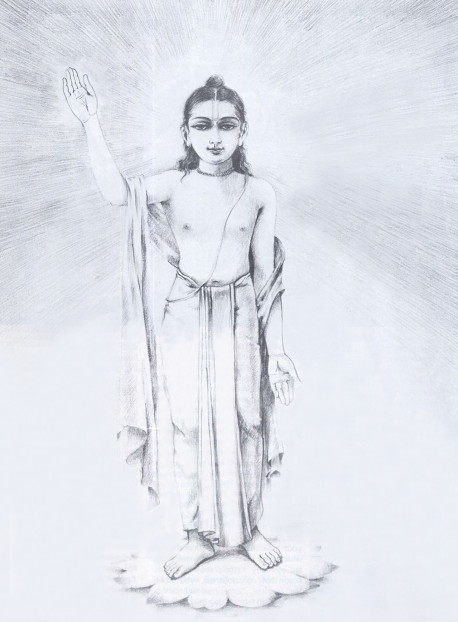
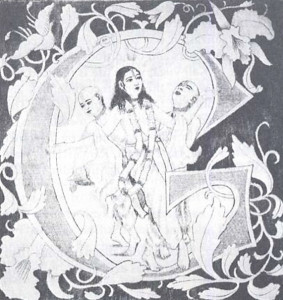
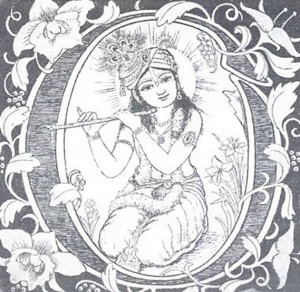
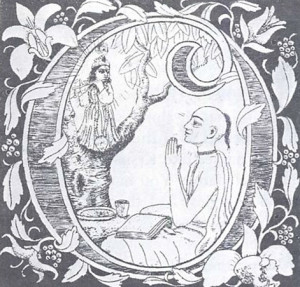
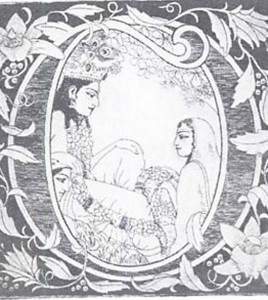
Leave a Reply